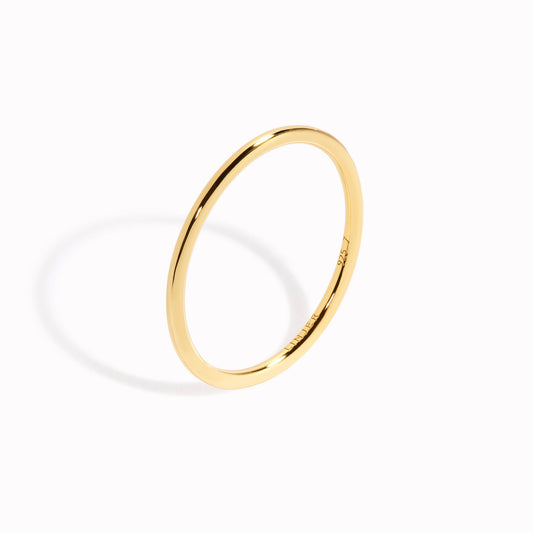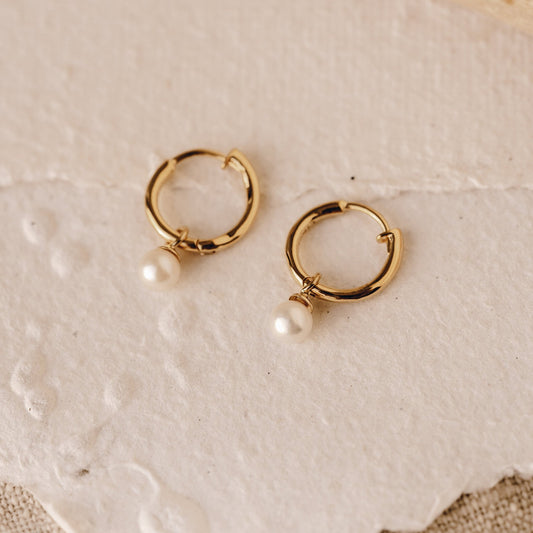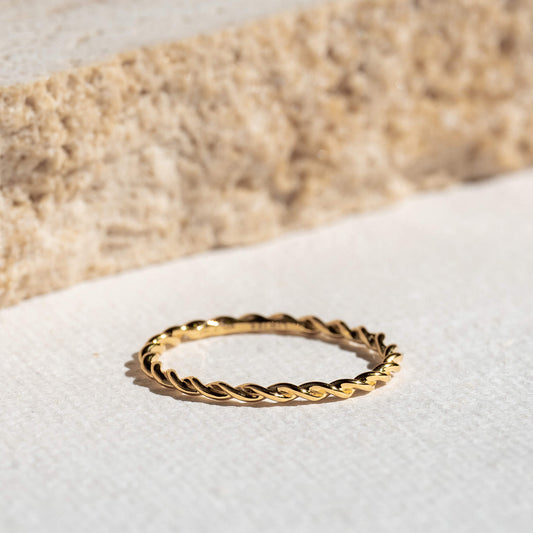Gold Vermeil vs Gold Filled: Which is Better? | Linjer Jewelry
What Does Gold Filled Mean?
Gold filled refers to jewelry that has a thin sheet of gold that has been mechanically bonded to the outside of a core material (usually copper or brass). You might imagine jewelry that is filled with gold, but in fact, the reverse is true—gold filled pieces are jewelry that is plated in gold.
The Federal Trade Commission allows for jewelry to be labeled as “gold filled” when “there has been affixed on all significant surfaces, by… mechanical means, a plating of gold alloy of not less than 10 karat fineness and… at least 1/20th of the weight of the metal.”
Ok. Let’s break that down. The “gold filled“ label (also sometimes “gold rolled” or “gold overlay”) applies when a cheaper base metal (usually copper or brass) is covered in a 10k or higher gold alloy (we’ll talk karats in a bit) using pressure and heat, and the gold covering is at least 5% the weight of the entire piece.
How Does Gold Filled Compare to Gold Vermeil?
Gold filled and gold vermeil jewelry both comprise an outer layer of gold covering a different base metal. Aside from that, there are some key differences.
- First, gold filled jewelry uses soldering or welding to apply the outer gold layer. Gold vermeil, on the other hand, uses electroplating, in which the metals are bonded through an ionization process.
- Second, gold vermeil guarantees a sterling silver core, whereas gold filled jewelry could contain brass, copper, silver, or even nickel in some cases.
- Third, the outer layer of gold in a gold vermeil piece must be at least 2.5 microns thick (that’s 2.5 thousandths of a millimeter), independent of the weight of the overall piece.
We’ll level with you; for a number of reasons, we are partial to gold vermeil as an excellent option for your jewelry collection—from special occasion pieces to daily staples. For the lowdown, check out our comprehensive guide to gold vermeil jewelry.


Does the Thickness of Gold Make a Difference in Gold Filled and Gold Vermeil Jewelry?
Yes, the thickness of gold in both gold filled and gold vermeil jewelry matters. The thickness of the outer layer influences the rate at which the jewelry will fade or tarnish. The general rule is the thicker, the better. With gold vermeil, thickness is determined by a standard width (2.5 microns) that is legally regulated. With gold filled, thickness is determined by percentage, at least 5% of the total weight—typically around 2 microns, but it could be more or less depending on the overall weight of the base metal and on what the jeweler decides.
When shopping for high-quality, long-lasting jewelry, whether gold filled or gold vermeil, look for pieces with optimal thickness. Linjer, for example, offers gold vermeil jewelry with a thickness factor between 2.5 and 3 microns.
Tennis Bracelet - Zilla |
Twist Ring - Dagmar |

See Product |

See Product |
Gold Stacking Ring - Liv |
Pearl Huggie Earrings - Kirsten |

See Product |

See Product |
Is Gold Filled Real Gold?
Yes, gold filled is considered real gold! Similar to gold vermeil jewelry, gold filled jewelry must have a layer of gold that is at least 10 karats, so yes both types of gold toned jewelry are considered real! 10 karat gold means that at least 41.7% (or 10 out of 24 karats) will be pure gold, and the other 58.3% (or 14 karats) will be other metals.
While 24k or pure gold sounds lavish, it is not a realistic choice for jewelry because its softness makes it incredibly prone to scratches and deformation. That’s why jewelers work with gold alloys and why Linjer offers daily staples in 22k gold vermeil with a 14k gold tone and special occasion pieces in 14k yellow and white gold!
Can You Shower With Gold Filled Jewelry?
Yes, you can shower while wearing gold filled jewelry thanks to the thick layer of gold plating, but you should probably avoid doing so if you would like to extend the durability and lifespan of your pieces. Even pure gold can be damaged by water exposure over time, so the more you shower (or expose your gold toned jewelry to water in any way, like washing the dishes), the more wear-and-tear will begin to show.
Not to mention, while in the shower, your gold jewelry risks being exposed to other substances, such as soaps and shampoos. And, water with heavy metals and higher concentrations of chlorine will also have an effect on your gold pieces.
Does Gold Filled Tarnish and Turn Green?
Gold filled jewelry does tarnish and turn green after wear and tear. Tarnishing (and green skin) are caused by oxygen, water, and other environmental chemicals reacting with various metals such as copper, in the case of green skin. Gold filled jewelry often uses a thin layer of gold over copper or brass; when the layer of gold inevitably rubs off, this causes the core metal to react with the outside elements, leading to the annoying tarnish we all hate to see!
That said, tarnishing can be prevented and repaired. (And, don’t worry, the green on your skin isn’t an allergic reaction). The thicker the gold, and the better quality the base metal, the more slowly a gold piece will tarnish. To keep your gold-toned pieces from tarnishing, remember to store it in a clean, dry environment, and cleanse it every so often with mild, non-chemical dish soap and warm water.
Does Gold Filled Wear Off?
Gold filled jewelry does eventually wear off. While gold filled is known for its longevity, depending on the thickness of gold, the outer layer can likely rub off over time. Obviously, the greater the thickness, the less quickly your gold filled pieces will wear down. (Don’t be afraid to ask for the width of the outer layer when purchasing gold jewelry).
Keep in mind that, while gold filled jewelry is known to be hardy and good for daily use, just like anything, the more care you give it, the longer it will last. And, consider the base metal, as gold bonds better to some metals than others, particularly silver.
Is Gold Filled Jewelry Hypoallergenic?
In short, yes and no - whether or not gold filled jewelry is hypoallergenic depends on the metals used to alloy the layer of gold, the thickness of the gold and the type of base metal used. Hypoallergenic means that a material has a very low probability of triggering an allergic reaction.
Nickel is a common allergen, and though no longer commonly used in gold filled jewelry today, it is still a good idea to double check. Brass and copper (more commonly used in gold filled jewelry) are both allergy-friendly metals, however, sterling silver is by far the best choice when it comes to sensitivity.
That’s why, at Linjer, we love gold vermeil. With a sterling silver core and 22k gold exterior with a 14k gold tone, Linjer’s jewelry is one of the most hypoallergenic options on the market!
How Long Does Gold Filled Jewelry Last?
With proper care, gold filled jewelry can last for many years. However, the longevity depends on various factors such as the karatage of the gold outer layer, how thick it is, the quality of the base metal, and the wear and tear that the piece will be exposed to.
Imagine a tennis player who likes to wear her favorite gold necklace daily during training, compared to a concert pianist who pulls out a special occasion piece 2 - 3 times a year. Clearly, even a super thick, high-quality necklace worn daily during exercise will wear out more quickly than a thin, low-karat necklace worn on occasion. That said, your gold filled, just like your gold vermeil jewelry, can really last when you treat it with some TLC. Similar to gold-plated jewelry, as the layer of gold eventually rubs off, the only way to replate it is through the process of electroplating, which ultimately turns your gold filled piece into a gold-plated product.
Open Leaf Ring - Ada |
Chunky Gold Hoop Earrings - Sissel |

See Product |

See Product |
Boho Necklace - Gaia |
Gold Hoop Earrings 30mm - Rebecca |

See Product |

See Product |
Is Gold Filled Good Quality?
Gold filled jewelry can be high-quality jewelry, but it isn’t guaranteed the same way that gold vermeil is. Once again, this really depends on the quality of the materials used.
Be aware that the manufacturing process for gold filled jewelry is quite a bit more expensive than for gold vermeil jewelry. This factor can hike the price of gold filled pieces, even pieces with low karatage and cheap base materials. Gold filled pieces are known for longevity, but that doesn’t necessarily equal quality. A 1.5 micron, 10k gold piece with a brass interior, for example, doesn’t have the same quality as a 2.5 micron, 10k gold piece with a sterling silver interior, which is a minimum guarantee with gold vermeil.
Which Lasts Longer, Gold Filled or Gold Vermeil?
The durability and lifespan of gold filled jewelry solely depends on the karatage and thickness of the gold, and the base metal used. Generally, gold filled jewelry is long-lasting due to the mechanical bonding process used to adhere the two layers, and it can certainly be a good choice for daily staples that run the risk of exposure to the elements. That being said, unlike gold vermeil, the quality of gold filled jewelry is not guaranteed.
The thickness of gold and base metal used in gold vermeil jewelry is regulated. The ionization or electroplating process of vermeil leaves a little room for penetration and flaking which is why gold vermeil assures a minimum level of thickness, thus lasting longer than some gold-filled pieces!
Is It Worth Buying Gold Filled Jewelry?
In the realm of gold-toned jewelry, it is not worth buying gold filled jewelry. Thanks to the tedious and outdated production process, gold filled jewelry is usually more expensive than it's worth. The quality of gold filled jewelry is not standardized the same way vermeil is, meaning you could be paying a steep price for a piece of jewelry that uses a low quality metal base with a thin layer of gold.
If you are looking for a high quality piece of gold toned jewelry that is long lasting AND affordable, we strongly recommend looking into gold vermeil! At Linjer, we admit that we’re big fans of gold vermeil. We love the hypoallergenic quality and value that the sterling silver base adds, as well as the strong bonding factor. With a 22k gold outer layer of up to 3 microns, we’re sure you’ll swoon for our high-quality Gold Vermeil Jewelry Collection! … and just wait until you see the designs!









